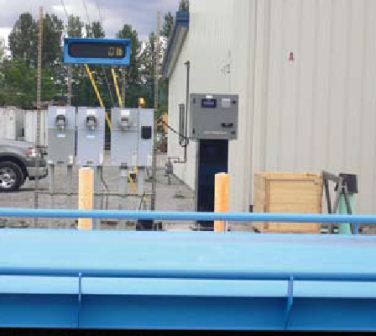Tanker Trucks Weighed Simply and Safely
At its liquid products transfer site in Portland, Oregon, Peninsula Terminal Company’s Transload Services Division receives tanker railcars transporting chemicals for the paper and fuel industries. The company’s customers rely upon Peninsula Terminal to help them transfer chemical loads from railcars to the customers’ tanker trucks and track the amount of chemicals offloaded. To provide increased accuracy and easy documentation of all weighments, Peninsula Terminal sought a robust truck scale/weighbridge offering multi-faceted operation.
Billing, inventory and legal compliance
“When our customers drive into our train yard, their trucks need to be weighed in,” said Jeff Fiederer, general manager at Peninsula Terminal. “The tanker trucks also must be weighed on the way out, once the chemicals have been transferred, to ensure the vehicles do not exceed legal weight. Plus, doing these two weighments allows us to determine the net weight of the chemicals for inventory control and billing purposes.”
The company had spoken with Avery Weigh-Tronix representatives in previous months when discussing past weighing applications, and these prior conversations led Peninsula Terminal to contact Avery Weigh-Tronix for their current scale system need.
A valuable asset
“The truck scale system Avery Weigh-Tronix offered looked like a valuable asset to our company, one that would help attract customers – and it has,” Fiederer added.
Mark Hudzinski, Avery Weigh-Tronix territory manager, suggested an above ground 80 x 11 ft. truck scale paired with an AVS-5 unattended scale console featuring an E1310 indicator. The combination would afford Peninsula Terminala simple yet robust weighing and documentation solution for its customers.
“Since the scale would be heavily used and installed above ground, we selected a scale with high capacity, rugged construction and guard rails for additional safety in a challenging climate,” Hudzinski said. “The Avery Weigh-Tronix scale system features patented Weigh Bar® technology for long-lasting, extremely accurate weighing and SensorComm™ technology to help ensure the system’s uninterrupted operation.”
Improved reliability via ‘ghost’ system
SensorComm improves a scale’s reliability by sending twelve digital signals from the weighbridge to the system indicator at once, with each cell transmitting a single signal. With this feature, if a nicked cable or equipment malfunction obstructs one of these signals, the indicator will assume the missing reading is identical to the other eleven. “This is known as a ghost weighing system, and while the weighments produced when a signal is obstructed may not be legal for trade, the SensorComm technology allows the vehicle to continue the weighing process. Meanwhile, the indicator’s results notify you that a service technician is needed,” Hudzinski said. “This SensorComm technology serves as a back-up system, but it also makes the equipment easier to calibrate and maintain.”
Unattended scale console
To add convenience to dependability, Peninsula Terminal uses Avery Weigh-Tronix’s AVS-5 unattended scale console with a 1310 indicator to provide drivers with a simple three-step weighing process. Upon approaching the scale, the driver enters the number assigned to the company and the individual truck number into the indicator. The scale then transmits the signals to the indicator, which translates the readings into a digital output and communicates the collected information via Ethernet to Peninsula Terminal’s office computers. This arrangement allows employees to monitor scale transactions in real-time without having a scale attendant on duty. The 1310 indicator then prints a receipt for the driver’s records and billing requirements.
“A great selling feature”
“Avery Weigh-Tronix’s system is easy to use, and it has proven very valuable,” Fiederer said. “Plus, since the scale is reserved only for our customers, we don’t have a long line of trucks waiting hours on end to use it, like you may see at public weigh stations.”
With robust construction, reliable accuracy and simple operation, this Avery Weigh-Tronix scale system has proven to be what Fiederer calls a “great selling feature” for Peninsula Terminal’s customers. “It provides our customers the documentation they need while saving them a significant amount of time,” Fiederer said.


 United States
United States  United Kingdom
United Kingdom  Canada
Canada  Canada (fr)
Canada (fr)  India
India  Malaysia
Malaysia